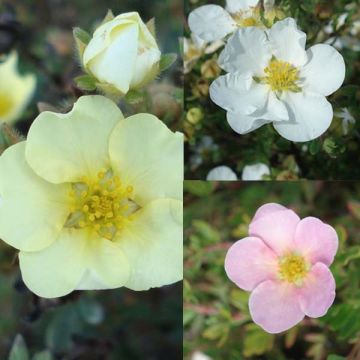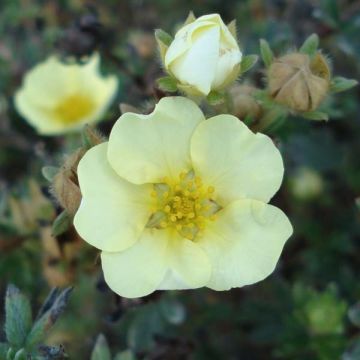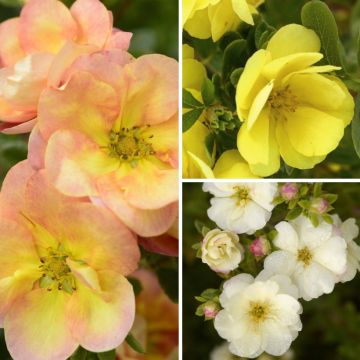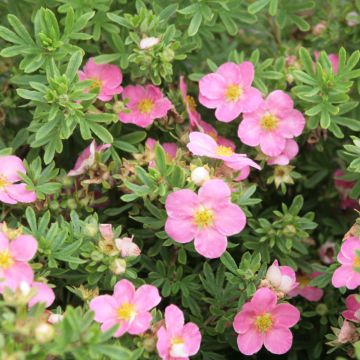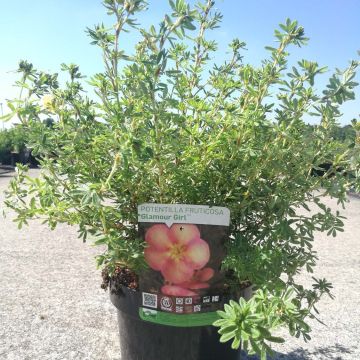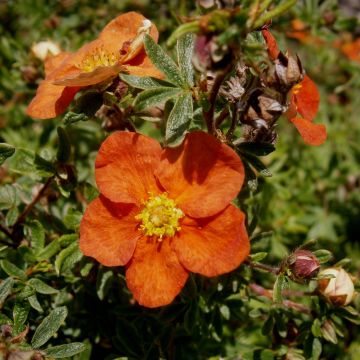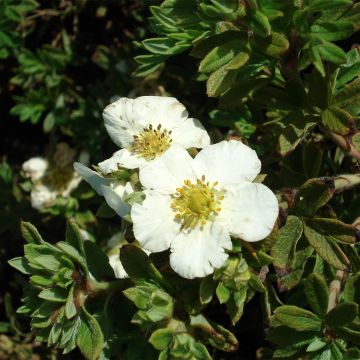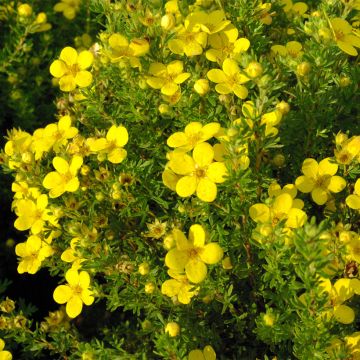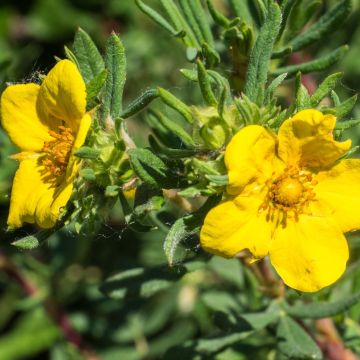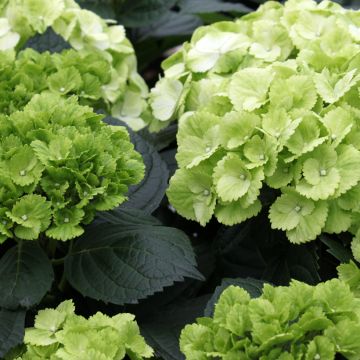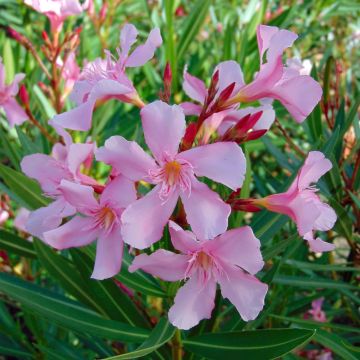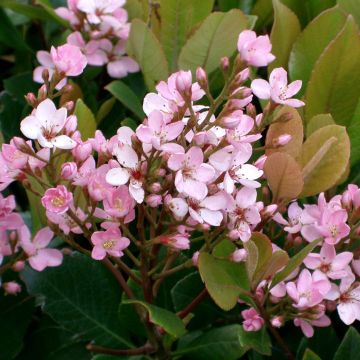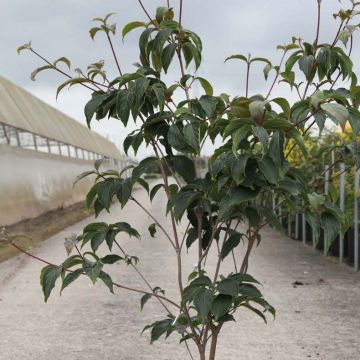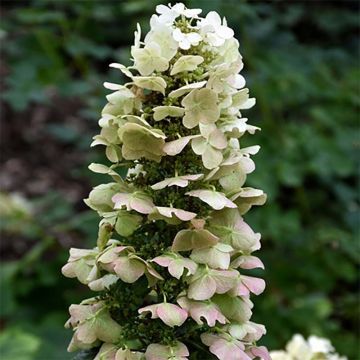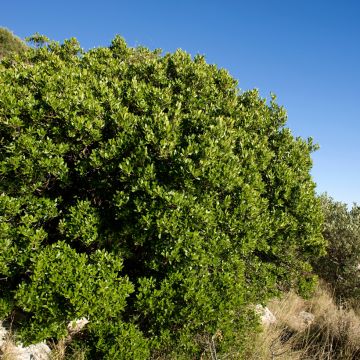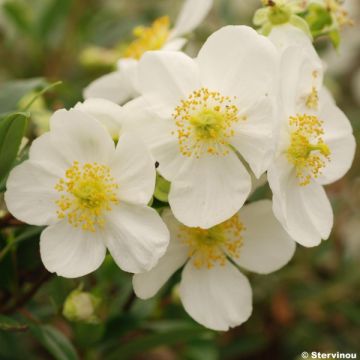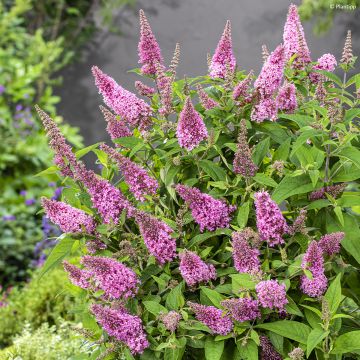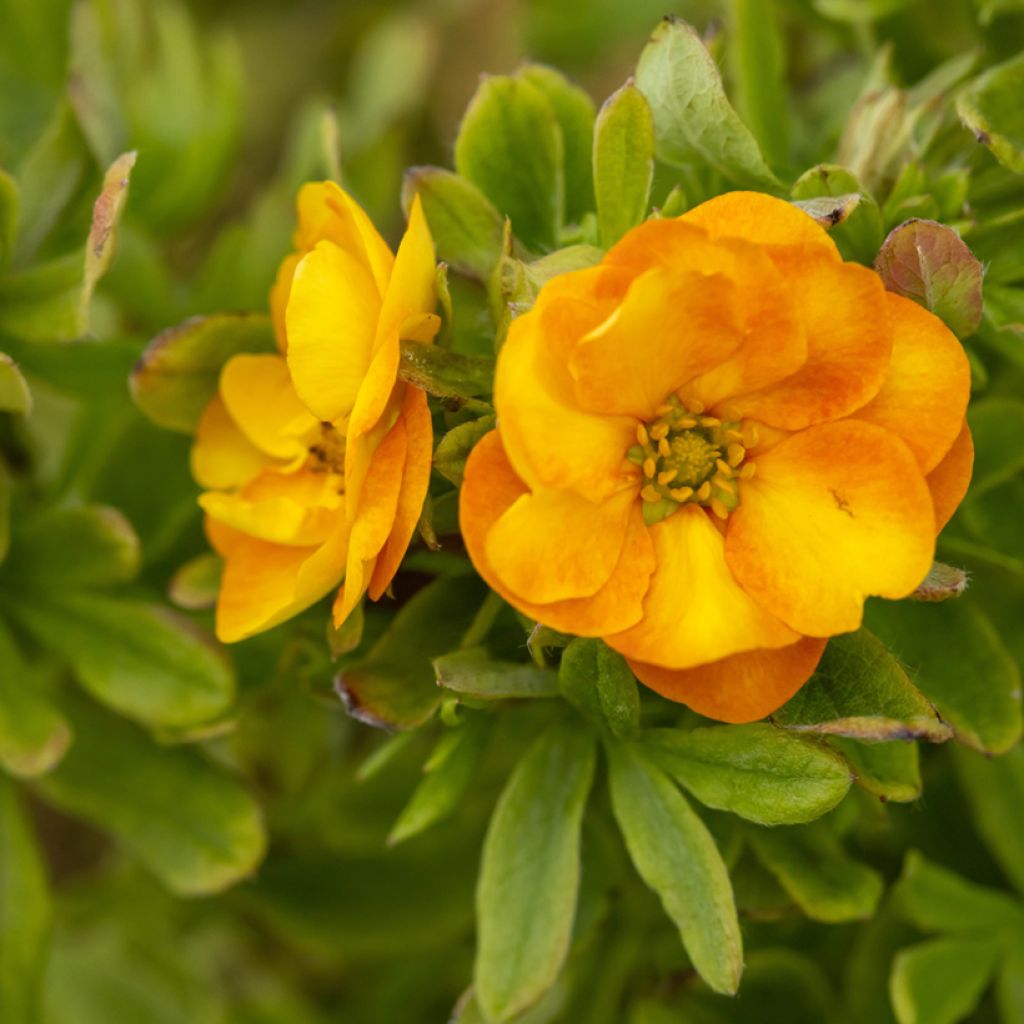

Potentilla fruticosa Marmalade
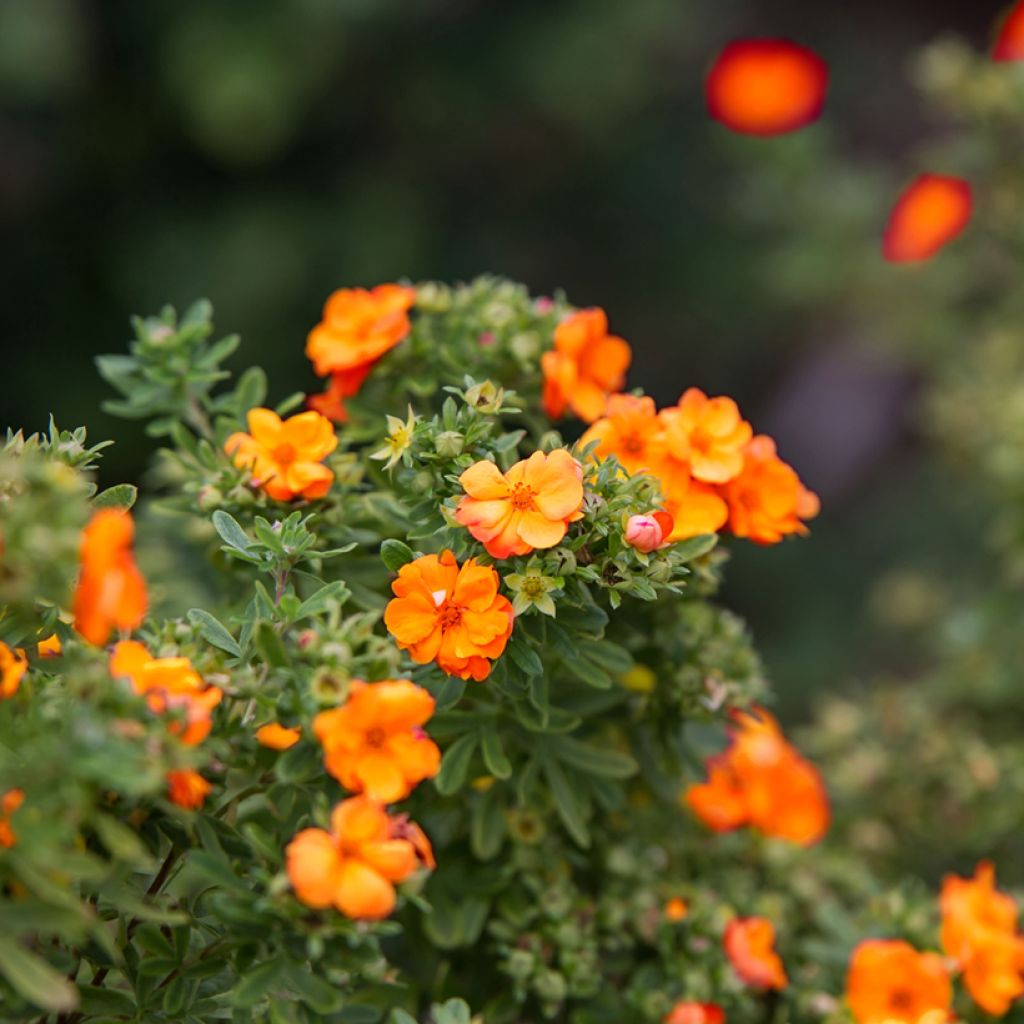

Potentilla fruticosa Marmalade
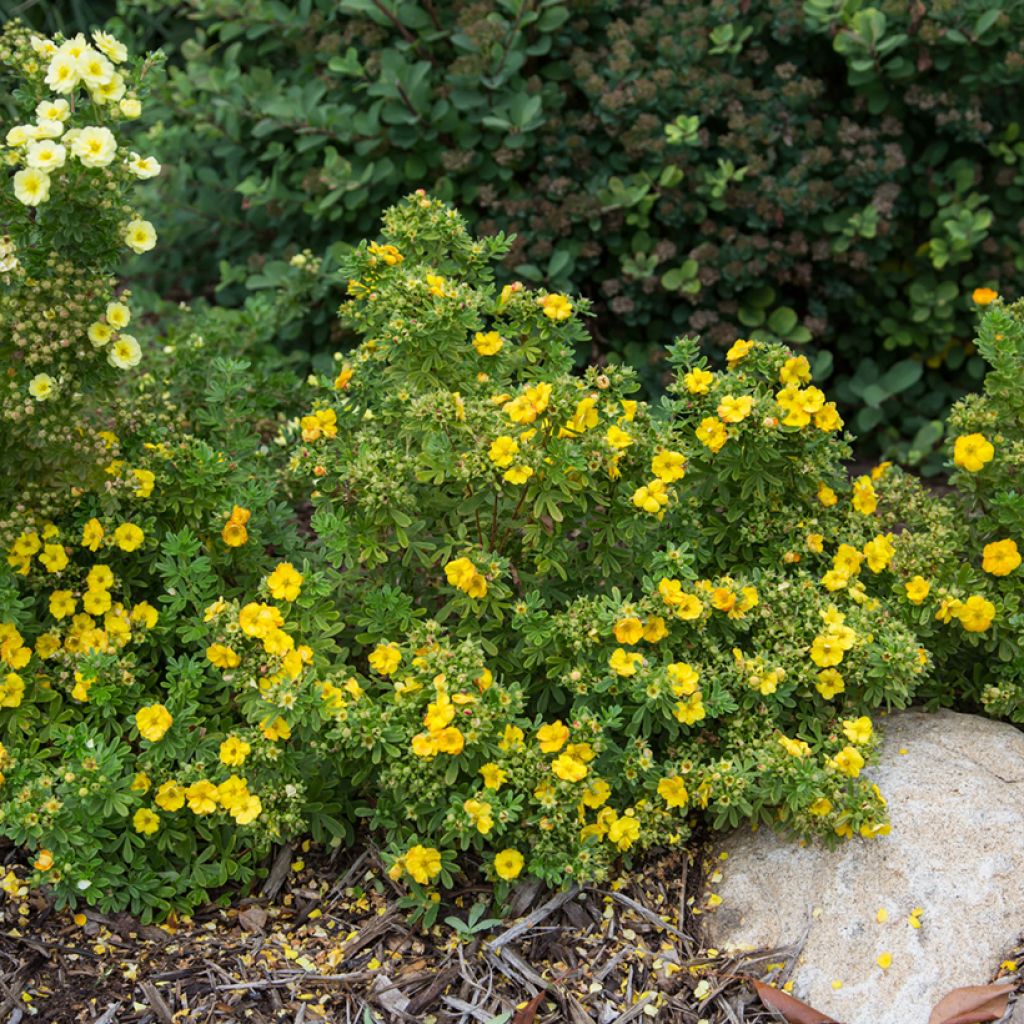

Potentilla fruticosa Marmalade
Potentilla fruticosa Marmalade
Potentilla fruticosa 'Jefmarm' Marmalade®
Shrubby cinquefoil, Golden hardhack, Hardhack, Prairie weed, Widdy
This item cannot be shipped to the selected country
Delivery charge from €5.90
More information
Schedule delivery date,
and select date in basket
This plant carries a 24 months recovery warranty
More information
We guarantee the quality of our plants for a full growing cycle, and will replace at our expense any plant that fails to recover under normal climatic and planting conditions.
From €5.90 for pickup delivery and €6.90 for home delivery
Express home delivery from €8.90.
Does this plant fit my garden?
Set up your Plantfit profile →
Description
Potentilla fruticosa 'Marmalade' is a variety of bushy potentilla with dense vegetation that produces bright orange double flowers. The bush has a naturally compact and rounded habit that does not require pruning. It is adorned with dark green foliage and blooms throughout the summer. Resistant to frost and water-efficient, it thrives in the sun in large borders and in pots on balconies. It is an easy and generous plant that thrives in any well-drained soil.
The Potentilla fruticosa 'Jefmarm' or 'Marmalade' is a recent horticultural creation by Dr. Wilbert Ronald from Jeffries Nursery, near Winnipeg in Canada. It is a woody shrub that belongs to the rose family, just like roses. This 'Marmalade' variety is exceptionally hardy. It has a rounded, bushy habit and particularly dense vegetation. At maturity, the plant will measure approximately 80 cm in all directions. Its slender and branched branches are brown, peel with age, and bear deciduous foliage that disappears in winter. The small size of the leaves, divided into narrow leaflets, gives a beautiful lightness to the dark green silhouette of this plant. The delicate flowers are double cups, well open, with a 2-3 cm diameter. The petals display shades of orange, and golden stamens occupy the centre of the flower. The abundant flowering, starting in June and ending in September, is generally more intense at the beginning of the period. It then loses vigour during the season if the soil is too dry.
In the sun, the bushy potentillas will deliver flowers with more vibrant colours, while in partial shade, the colour will be slightly less intense. These trouble-free plants, generous and beautifully coloured, are ideal for brightening up the garden or balcony effortlessly and sustainably. With their Scottish rose-like appearance and very modest requirements, they can be used in multiple ways and planted anywhere: in flower beds, rockeries, borders, low hedges, containers... Under most climates and in any well-drained soil. The 'Marmalade' potentilla will be particularly striking when paired with bushy salvias in blue, orange, or red colours, along with yarrows, Gauras, globe thistles, Corsican spurge, and low grasses like Stipa tenuifolia. It pairs ideally with 'Hidcote' lavender for a warm and fragrant atmosphere. Potentillas create stunning large borders in front of a screen of evergreen shrubs.
Report an error about the product description
Potentilla fruticosa Marmalade in pictures


Plant habit
Flowering
Foliage
Botanical data
Potentilla
fruticosa
'Jefmarm' Marmalade®
Rosaceae
Shrubby cinquefoil, Golden hardhack, Hardhack, Prairie weed, Widdy
Cultivar or hybrid
Other Potentilla - Cinquefoils
Planting and care
A very easy-to-care-for plant, the 'Marmalade' Potentilla fruticosa is hardy and can withstand very low negative temperatures (-20°C). It prefers a sunny exposure. Its only absolute requirement concerns the nature of the soil where it is planted. Indeed, it requires ordinary soil that is not too rich and well-drained, with a tendency towards limestone but not too arid. Heavy, clayey soils are not suitable for it. In this case, placing it on a slope or in a rockery will be necessary to facilitate water drainage. It is also possible to lighten the soil when planting by adding coarse sand and gravel to improve drainage. An additional quality to add to its achievements is its good tolerance to drought once established. The shrubby potentilla does not require much maintenance. Flowering on the shoots of the year and simple annual pruning is sufficient. It is recommended to cut in half the stems that have borne flowers the previous year, just above a bud, in early spring to stimulate regrowth and maintain the beautifully bushy shape of your potentilla. Removing faded flowers as they appear during flowering is also advisable, as it prolongs them for a long time.
Planting period
Intended location
Care
This item has not been reviewed yet - be the first to leave a review about it.
Summer-flowering shrubs
Haven't found what you were looking for?
Hardiness is the lowest winter temperature a plant can endure without suffering serious damage or even dying. However, hardiness is affected by location (a sheltered area, such as a patio), protection (winter cover) and soil type (hardiness is improved by well-drained soil).

Photo Sharing Terms & Conditions
In order to encourage gardeners to interact and share their experiences, Promesse de fleurs offers various media enabling content to be uploaded onto its Site - in particular via the ‘Photo sharing’ module.
The User agrees to refrain from:
- Posting any content that is illegal, prejudicial, insulting, racist, inciteful to hatred, revisionist, contrary to public decency, that infringes on privacy or on the privacy rights of third parties, in particular the publicity rights of persons and goods, intellectual property rights, or the right to privacy.
- Submitting content on behalf of a third party;
- Impersonate the identity of a third party and/or publish any personal information about a third party;
In general, the User undertakes to refrain from any unethical behaviour.
All Content (in particular text, comments, files, images, photos, videos, creative works, etc.), which may be subject to property or intellectual property rights, image or other private rights, shall remain the property of the User, subject to the limited rights granted by the terms of the licence granted by Promesse de fleurs as stated below. Users are at liberty to publish or not to publish such Content on the Site, notably via the ‘Photo Sharing’ facility, and accept that this Content shall be made public and freely accessible, notably on the Internet.
Users further acknowledge, undertake to have ,and guarantee that they hold all necessary rights and permissions to publish such material on the Site, in particular with regard to the legislation in force pertaining to any privacy, property, intellectual property, image, or contractual rights, or rights of any other nature. By publishing such Content on the Site, Users acknowledge accepting full liability as publishers of the Content within the meaning of the law, and grant Promesse de fleurs, free of charge, an inclusive, worldwide licence for the said Content for the entire duration of its publication, including all reproduction, representation, up/downloading, displaying, performing, transmission, and storage rights.
Users also grant permission for their name to be linked to the Content and accept that this link may not always be made available.
By engaging in posting material, Users consent to their Content becoming automatically accessible on the Internet, in particular on other sites and/or blogs and/or web pages of the Promesse de fleurs site, including in particular social pages and the Promesse de fleurs catalogue.
Users may secure the removal of entrusted content free of charge by issuing a simple request via our contact form.
The flowering period indicated on our website applies to countries and regions located in USDA zone 8 (France, the United Kingdom, Ireland, the Netherlands, etc.)
It will vary according to where you live:
- In zones 9 to 10 (Italy, Spain, Greece, etc.), flowering will occur about 2 to 4 weeks earlier.
- In zones 6 to 7 (Germany, Poland, Slovenia, and lower mountainous regions), flowering will be delayed by 2 to 3 weeks.
- In zone 5 (Central Europe, Scandinavia), blooming will be delayed by 3 to 5 weeks.
In temperate climates, pruning of spring-flowering shrubs (forsythia, spireas, etc.) should be done just after flowering.
Pruning of summer-flowering shrubs (Indian Lilac, Perovskia, etc.) can be done in winter or spring.
In cold regions as well as with frost-sensitive plants, avoid pruning too early when severe frosts may still occur.
The planting period indicated on our website applies to countries and regions located in USDA zone 8 (France, United Kingdom, Ireland, Netherlands).
It will vary according to where you live:
- In Mediterranean zones (Marseille, Madrid, Milan, etc.), autumn and winter are the best planting periods.
- In continental zones (Strasbourg, Munich, Vienna, etc.), delay planting by 2 to 3 weeks in spring and bring it forward by 2 to 4 weeks in autumn.
- In mountainous regions (the Alps, Pyrenees, Carpathians, etc.), it is best to plant in late spring (May-June) or late summer (August-September).
The harvesting period indicated on our website applies to countries and regions in USDA zone 8 (France, England, Ireland, the Netherlands).
In colder areas (Scandinavia, Poland, Austria...) fruit and vegetable harvests are likely to be delayed by 3-4 weeks.
In warmer areas (Italy, Spain, Greece, etc.), harvesting will probably take place earlier, depending on weather conditions.
The sowing periods indicated on our website apply to countries and regions within USDA Zone 8 (France, UK, Ireland, Netherlands).
In colder areas (Scandinavia, Poland, Austria...), delay any outdoor sowing by 3-4 weeks, or sow under glass.
In warmer climes (Italy, Spain, Greece, etc.), bring outdoor sowing forward by a few weeks.

































